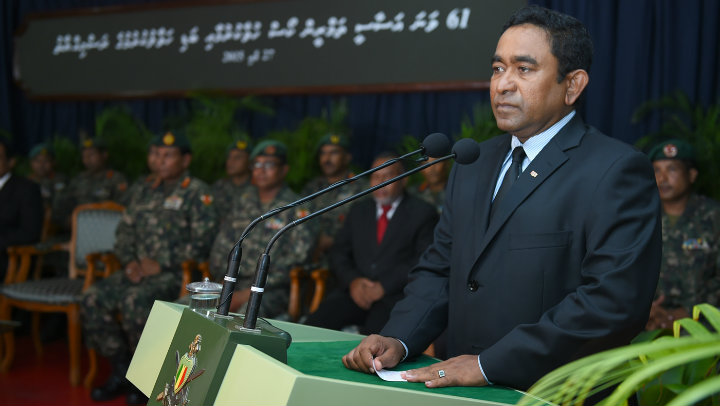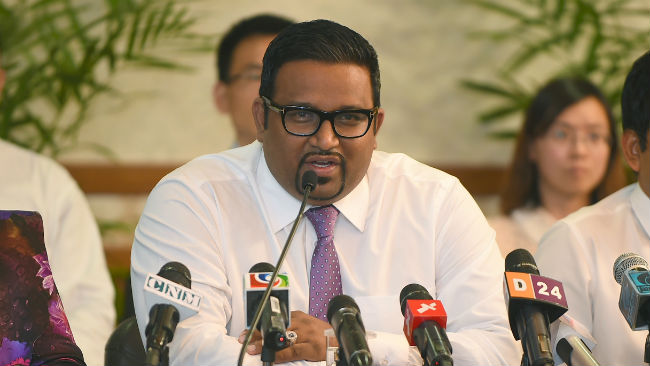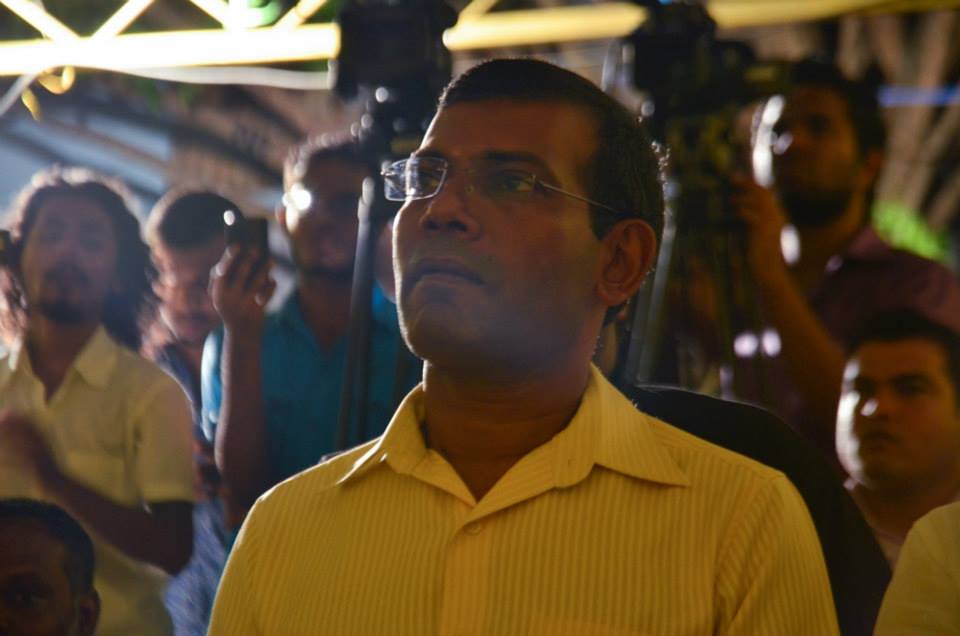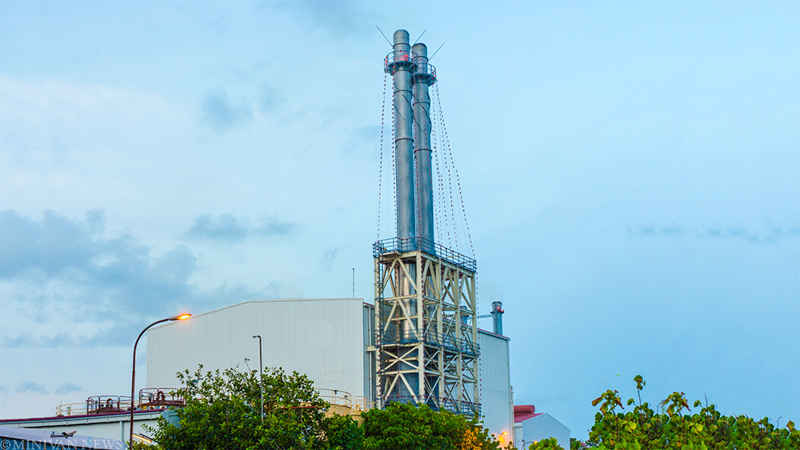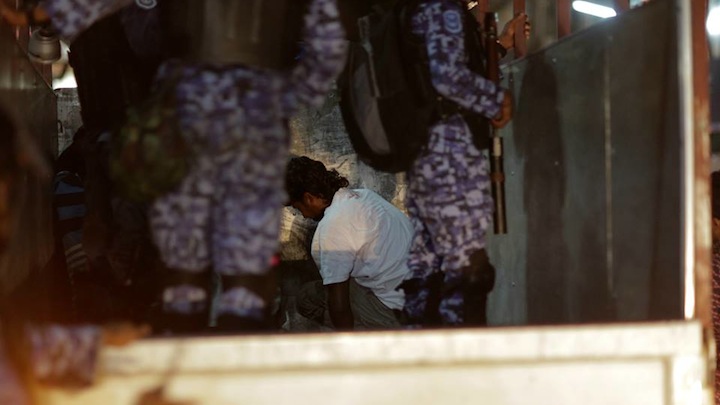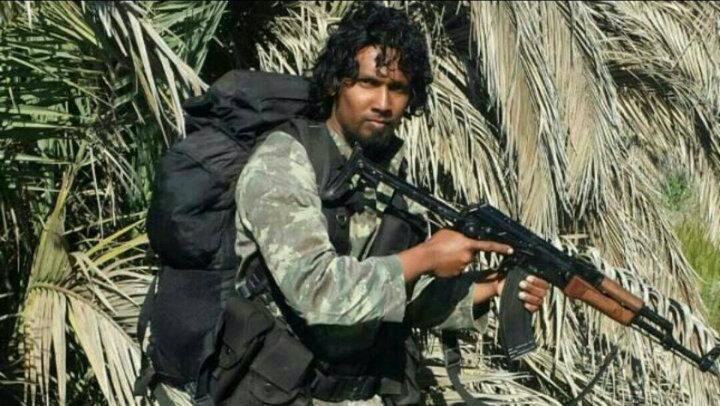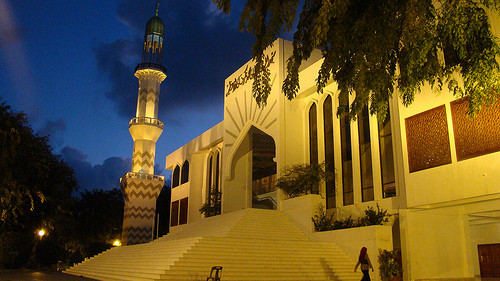First came a deafening shot. Then, police in riot gear charged into the crowd, shoving and pushing protesters back. But Hamid Shafeeu and his friends did not run. They were arrested in front of Minivan News journalists. Now a police officer has sworn Hamid threw bottles and stones at the riot police.
Some 193 protesters were arrested on May 1 when violent clashes broke out after a historic antigovernment protest. Scores were injured.
Protesters threw glass and plastic bottles, lead balls and rocks. Police used tear gas, pepper spray, stun grenades and made indiscriminate arrests.
The next day, the criminal court granted a blanket 15-day remand for 173 of the 193 detainees.
Hamid was held in police custody for 15 days in cramped conditions, and then transferred to house arrest for five days. He was released only today.
The high court, relying on police statements, previously rejected an appeal contesting the detention.
The 39-year-old businessman says he believes police are providing false testimony to jail him because of his vocal criticism of the government on Twitter.
Many others who were arrested at random or arrested for simply going to the protest now say police officers have accused them of assault.
The initial charges of disobedience to order carries a MVR3000 fine or six months in jail or house arrest or banishment, but attacking a police officer carries a MVR12, 000 fine and six months in jail.
It is not yet clear if the prosecutor general will file charges.
A police spokesperson has denied allegations of false testimony, but lawyers who have represented individuals arrested from past protests say the police routinely lie to keep dissidents in custody. Others have supported the claim, with the former chair of the police integrity watchdog saying several officers lied in the investigation into the transfer of power in February 7, 2012, and the brutal crackdown on protesters the next day.
A former policeman, meanwhile, said false testimony is indicative of the politicization of the force and the impunity riot police hold as very few are penalized for unlawful activities.
SO
Testifying before a Commonwealth backed inquiry into the 2012 transfer of power, ex-police chief Ahmed Faseeh described the riot police’s tactics in controlling protests: “Their language was filthy, their vocabulary was obscene. If they got hold of someone, they hit them.”
The riot police, known as Specialist Operations or SO officers, were created by former president Maumoon Abdul Gayoom to quell pro-democracy protests in the mid 2000s. The hostility between SO officers and protesters continues to this day.
May Day detainees have reported verbal and physical abuse, while several individuals arrested on suspicion of assaulting a police officer on May Day said police cheered on as others beat them at the headquarters and threatened to kill them.
The police, however, have denied brutality and urged any victims to file complaints with oversight bodies.
Blogger Yameen Rasheed’s arrest was caught on camera. He was picked up on Chaandhanee Magu with several others at about 9pm, but the police are now accused him of throwing rocks and have placed him under house arrest. Yameen says he was walking to the Somerset Hotel in the area to meet a foreign journalist at the time of his arrest. The Indian reporter corroborates Yameen’s account.
Ahmed Naeem, a 25-year-old political science student, was arrested when he reportedly stepped in front of a police van. Of the 193 detainees, he is the only one remaining in police custody.
Lawyers say the police are now accusing him of breaking the van’s windows. According to his cellmates, police beat Ahmed severely at the time of his arrest, and his face was bruised and swollen for days.
Judges can only hold people in custody if further interrogation is needed, or if they are a danger to society, or if they may influence witnesses.
But lawyers claims judges remand dissidents for long periods of time to intimidate and harass them. The criminal court often holds protesters in custody for lengthier periods than those arrested for violent crimes, including murder, they said.
Lawyer Abdulla Haseen, who represented a close aide of ex-president Nasheed following her arrest from a protest in July 2012, said the police claimed in court that they had witnessed her throwing rocks. But Shauna Aminath’s arrest, which was broadcast live on television, showed the police drag her away without any provocation.
“An individual can be held in remand for a month, two months. Judges must verify and check police’s claims before approving long remands. Who will bear responsibility for all those lost weeks?” Haseen said.
Politicized
The ex chair of the police integrity commission (PIC), Shahindha Ismail, said police officers had provided strikingly similar statements to the commission’s investigation into the February 8, 2012 crackdown “with the same phrases and words as if they were reading from a pre-prepared document.”
Although four of the five members of the then-PIC ruled police actions on February 8 as lawful, Shahindha said officers had “targeted attacks to cause immense harm to specific individuals.”
She said the squad must be disbanded and punished for unlawful behavior. She urged judges to verify police claims with photos and videos or statements by unbiased witnesses before approving requests for lengthy detentions.
In October, SO officers were accused of cutting down all of Malé City’s Areca palms. In January, they were accused of planting weapons at the ex-defence minister Mohamed Nazim’s apartment. The retired colonel was sentenced to 11 years in prison based on anonymized witness statements, which Nazim’s lawyers argue, were fabricated.
The prosecutor general’s office said it has not received complaints of false testimony by police or noticed any attempts at framing individuals.
Meanwhile, noting the role SO officers played in ex-president Mohamed Nasheed’s ouster, a former senior police officer said the squad was politically biased and “enjoy complete impunity, now to the point they feel they can do whatever they want.”
He, too, supported disbanding the SO, saying they regard routine police work as outside their duties. Faseeh had said the same in his statement.
The ex-officer said maintaining public order or riot control must be integrated into regular policing: “That way officers get to work together with people every day and will be more sensitive towards rights,” he said.
Photo by Shaari
Likes (4)Dislikes
(4)Dislikes (0)
(0) 